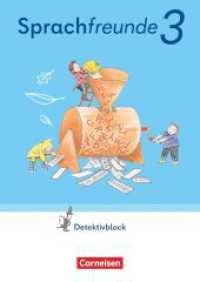- ホーム
- > 洋書
- > 英文書
- > History / World
Full Description
Andean Truths: Transitional Justice, Ethnicity, and Cultural Production in Post-Shining Path Peru studies how literature, drama, film, and the visual arts contest the dominant narrative of national peace and reconciliation, as constructed by Peru's Truth and Reconciliation Commission. Established in 2001, the Commission aimed to 'investigate and make public the truth' of the country's twenty-year civil war, drawing upon homologous predecessors that provided a highly scripted model of truth-gathering and national healing. In this model, a predetermined collective mourning, catharsis, and reconciliation would move the nation forward in a consensually-determined fashion. Andean Truths shows that the Peruvian case proves internationally-endorsed models insufficient for arriving at the 'truth' of a national trauma that primarily affected disenfranchised ethnic groups, namely, the Andean Quechua speaking populations that accounted for the overwhelming majority of victims of the violence. Even as scholars recognize the importance of bringing multiple voices to the table in discussing post-Shining Path Peru, we are still trying to understand what a more Andean-oriented transitional justice process might entail. Drawing on theories of decoloniality, intercultural communication and epistemological diversity (following scholars such as Enrique Dussel, Aníbal Quijano and Boaventura de Sousa Santos), Lambright analyzes cultural products, from the theater of Yuyachkani to the narrative of Oscar Colchado Lucio, the art of Edilberto Jiménez, and other popular artistic responses, that highlight Andean understandings of the conflict and its aftermath. These cultural products challenge dominant understandings of the conflict and question Peru's ability to overcome its collective trauma without seriously reconsidering prevailing cultural paradigms.
Andean Truths was awarded the 2015 Modern Language Association's Katherine Singer Kovacs Prize for Outstanding Book on Latin America or Spain.
Contents
Acknowledgements
Introduction
1. Sustaining Dominant Narratives: La hora azul, Abril rojo, and Un lugar llamado Oreja de Perro
2. Transitional Justice and Reconciliation through Identification: Paloma de papel and La teta asustada
3. Dead Body Politics: Grupo Cultural Yuyachkani at the CVR Hearings
4. Towards a Narrative Pachacutic: Rosa Cuchillo
5. Collaborative Truth-Telling: The Art of Edilberto Jiménez and the Chungui Testimonies
6. Reconciling through Other Knowledges: The Yuyarisun Contests in Ayacucho
Conclusion: Some Thoughts on Memory Museums
Bibliography
Index







